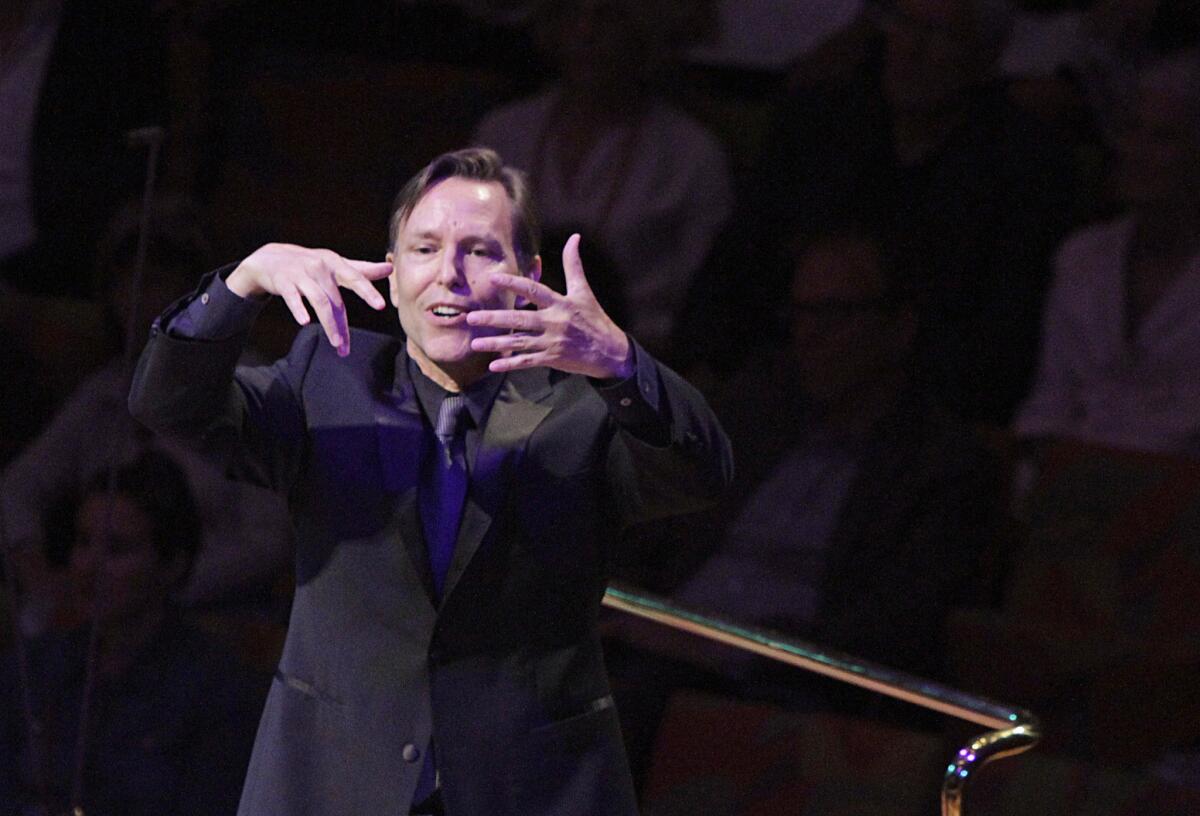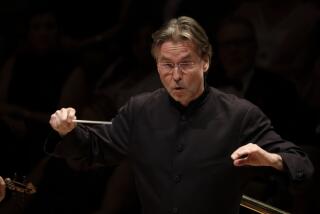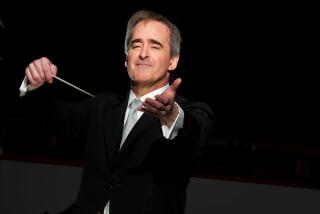Review: L.A. Master Chorale caps its 50th season with three new works

The Los Angeles Master Chorale ended its 50th season Sunday night at Walt Disney Concert Hall with the premiere of three new works commissioned for the occasion and two other recent Chorale commissions. That’s news. But so too is the way that this chorus operates.
In a time when collective bargaining has put too many major musical institutions in a poor public light, with musicians increasingly holding out for high salaries and benefits that managements insist are unsustainable, the singers of Master Chorale have done something I’ve not heard of before. Wanting a piece of the celebratory action, the choristers themselves pooled their resources to commission one of the works.
With their own money on the line, they aimed unreasonably high, hoping for a major composer who also intimately knew the sound of the chorus and of Disney. There is only one — Esa-Pekka Salonen. As former music director of the Los Angeles Philharmonic, he has worked with the chorus for half of its existence. Moreover, Master Chorale music director Grant Gershon happens to have been Salonen’s assistant conductor at the L.A. Phil in the 1990s.
No matter, though, that Salonen is ever overbooked and is a deadline junky who has written little for chorus and who writes difficult music. As of January, Gershon told the audience, Salonen hadn’t come up with a text. But he came through, and Sunday’s concert ended with the first performance of “Iri da Iri” for a cappella chorus, the final canto of Dante’s “Paradiso” inundated with fleshy clouds of Salonen’s iridescent choral sonorities.
After his descent into the terrors of the “Inferno” and “Purgatorio,” Dante ascended, in his “Divine Comedy,” to the concentric spheres surrounding Earth. There he found the glories of divine love. The Master Chorale obviously could not know what it was getting from Salonen or from another major commission, David Lang’s “the national anthems,” which preceded it. But the juxtaposition proved profound.
Lang has had the most remarkable 12 months of any composer. His new pieces have ranged from “the whisper opera” at Lincoln Center (where the singers whispered in the ears of the audience) to “crowd out” for 1,000 people hollering (and whispering, speaking and singing) on a street in Birmingham, England. The latter happened to be Sunday, as well, when the Master Chorale premiered “the national anthems.”
Both works represent a crowd-sourcing effort to explore the inner workings of humanity. The text for the British mob was derived from Internet crowd-sourcing into how people feel about crowds (often fearful). The Master Chorale “anthems” was made from snippets taken from each of the 193 member states of the United Nations.
These are not always happy refrains. Nations, Lang learned, coalesce like crowds just as much though fear as through love, and here, the composer became a collector of tears and threats. Peace and happiness require the spilling of “fragrant blood.” Anthems are battle cries to lay claim: “our pride is our pride,” “our future is our future,” “our meaning is our meaning.”
Lang organized the fragments into five movements around the themes of peace, glowing hearts, glory, freedom and communality. It is a surprisingly sad text, and the setting for a small chorus and string quartet is hauntingly effective with vocal lines intoned on few pitches over a narrow range.
The Calder Quartet provided a glassy accompaniment. Gershon kept the chorus sounding frighteningly fragile, producing a tactile expression of nation states skating on exceedingly thin ice.
The third premiere was Shawn Kirchner’s “Inscapes” for a cappella double choir. A member of the ensemble and the Master Chorale’s composer-in-residence, Kirchner set four poems of Gerard Manley Hopkins, music closely mirroring heavily perfumed songs of nature best left to those better able to stomach Hopkins than I am.
The major revival was Gabriela Lena Frank’s “Los Cantores de las Montañas,” (“The Singing Mountaineers”), which the Master Chorale first performed two years ago and was this time led by associate conductor Lesley Leighton. The Peruvian folk group Huayucaltia accompanied the Berkeley composer’s delicious Andean modernism.
Meanwhile, Francisco Núñez’s “Es Tu Tiempo” (“It Is Your Time”) was less a revival, having been commissioned for the Master Chorale’s 25th annual High School Choir Festival only last month, than a fine shout out to lively student singers and instrumentalists who joined the Master Chorale. Núñez, who founded the Young People’s Chorus of New York City, brought the kids to exceptional life.
The best dancer on the podium in the business, Núñez got even got the Master Chorale moving some. After 50 years, as this remarkable concert proved, it really is their time.
@markswed
More to Read
The biggest entertainment stories
Get our big stories about Hollywood, film, television, music, arts, culture and more right in your inbox as soon as they publish.
You may occasionally receive promotional content from the Los Angeles Times.







